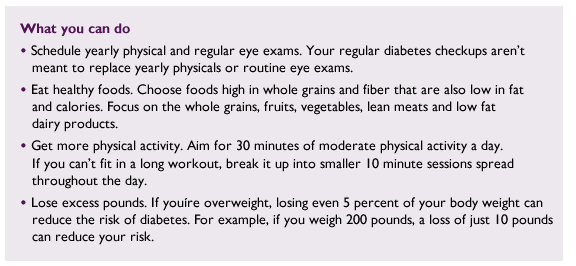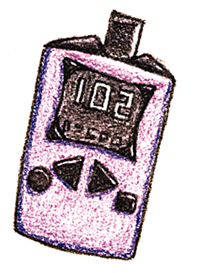Diabetes Mellitus
How Does Your
Body Use Blood Sugar?
Kristine Reesman, DO
Internal Medicine
Tammy Schofield, RD
Dietitian
Eau Claire Medical Clinic
Eau Claire
Diabetes mellitus is a disease that affects how your body uses blood glucose, commonly called blood sugar. Glucose is important to your health because it is the main source of energy for the body. If you have diabetes, no matter what type, it means you have too much glucose in your blood which can lead to serious health problems. Chronic diabetes conditions include type 1 diabetes, often referred to as juvenile diabetes, and type 2 diabetes, often referred to as adult onset diabetes. Diabetes affects approximately 8% of people in the United States and about that same number are not yet diagnosed with the disease and are therefore unaware and untreated. Complications from diabetes mellitus account for nearly 14% of health care expenditures in the United States. Diabetes is a costly disease in many ways, especially to the patient, with damage to vital organs as a result of poor blood sugar control.
The development of adult onset type 2 diabetes is often difficult to recognize as it occurs over a number of years. Researchers don’t fully understand why some people develop pre diabetes and type 2 diabetes and others don’t. However, it is clear that certain factors increase the risk:

Screening is simple and involves annual testing of blood sugar after fasting. Levels of fasting blood sugar greater than 126 and non-fasting levels of greater than 200 make the diagnosis. If patients are not screened, often small vessel changes from diabetes are present at diagnosis. Small vessels affected most often include the arteries to the kidneys, eyes, legs and small nerves. Due to the development of blockages in these small vessels, kidney failure, blindness and infected foot ulcers are among the common complications of long-standing uncontrolled blood sugars. The results can be devastating if control of blood sugar is not achieved.

If you’ve been diagnosed?
Adequate control of diabetes is a collaborative effort involving the patient, the physician, the nutritionist and the diabetes educator. After the diagnosis of diabetes is established, patients and physicians will often enlist the assistance of a “diabetes educator” to teach the affected person about careful monitoring of their diet, weight control and weight loss, as well as the use of blood sugar testing materials. Taking oral medications and the commitment of the patient to adhere to a diet and exercise program is the cornerstone of initial treatment. If diabetes is diagnosed early  and the patient is willing to actively participate in the lifestyle changes and the medication regimen recommended, insulin may be avoidable. Personal involvement and education of the diabetic patient yields the best result in blood sugar control, and the prevention of the onset of complications.
and the patient is willing to actively participate in the lifestyle changes and the medication regimen recommended, insulin may be avoidable. Personal involvement and education of the diabetic patient yields the best result in blood sugar control, and the prevention of the onset of complications.
Because diabetes can affect the blood vessels of the eye and potentially cause blindness, diabetics should have regular eye examinations including an annual dilated eye exam. Any rapid changes in vision should be reported to your healthcare provider immediately. Laser therapy to the eye can stop the progressive loss of vision that can occur. Annual urine checks to monitor for kidney disease, and annual foot testing to assess for changes in circulation and vascular damage are equally important. In addition, a blood test should be performed every three to six months to assess blood sugar control over several months, along with review of the patient’s personal blood sugar log.
Controlling diabetes is an effort that involves a team of health care professionals and the patient in all aspects of treatment. The level of patient cooperation dramatically impacts the outcome of the disease.
Dr. Reesman – Eau Claire Medical Clinic
For information or to schedule an appointment:
715.839.9280 | www.eauclairemedical.com
Dr. Reesman sees patients in Eau Claire.






 © 2011 OakLeaf Medical Network and OakLeaf Surgical Hospital. All rights reserved.
© 2011 OakLeaf Medical Network and OakLeaf Surgical Hospital. All rights reserved.